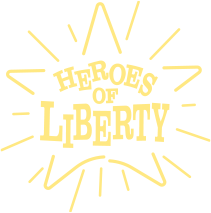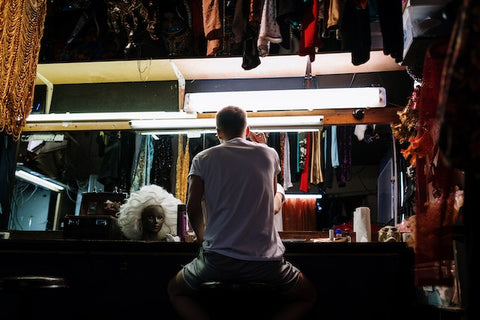In 2015, Michelle Tea visited her local library in San Francisco with her newborn son, Atticus, to attend a children’s reading event. Michelle, a queer activist, thought the event was useful, but too ‘heteronormative’ for her young family, so she decided to create her own.
“There is just a sort of flair with which queers do anything,” she later told Buzzfeed News. “It's just a certain sense of humor, a sense of the fantastic.”
She approached a library in Castro, a famously queer neighborhood in San Francisco, to host her event, and invited a drag queen in to read queer-inclusive children’s books to toddlers and babies.
“It was a huge hit,” Tea said, “and then it just spread.”
Drag Queen Story Hour now has 40 chapters across the United States, and many more abroad, with events taking place as far afield as the United Kingdom, Brazil and Japan.
Why is Drag Queen Story Hour controversial?
In their own words, Drag Queen Story Hour “captures the imagination and play of the gender fluidity of childhood and gives kids glamorous, positive, and unabashedly queer role models. In spaces like this, kids are able to see people who defy rigid gender restrictions and imagine a world where everyone can be their authentic selves!”
They state that their mission is to celebrate “reading through the glamorous art of drag,” adding “Our chapter network creates diverse, accessible, and culturally-inclusive family programming where kids can express their authentic selves and become bright lights of change in their communities.”
Their supporters insist that the events are just harmless fun and provide spaces for children who are different to be themselves.
Drag queen ‘Gothy Kendall’ told GCN, “A lot of kids identify with dressing up, with exploring gender and sexuality. To see their families supporting them means the world.”
Jodie Harsh agreed, adding: “It’s not going to ‘turn’ kids any certain way. It’s just a lovely, harmless cultural moment, and luckily the parents here are open-minded and cool about allowing their children to appreciate the art form.”
But some drag performers have spoken out against the events, pointing out that drag is a sexualized art form, and as such is inappropriate for children.
Drag queen ‘Kitty Demure’ is one of them. Earlier this year he made a video addressing parents directly, asking: “Would you want a stripper or a porn star to influence your child? It makes no sense at all! A drag queen performs in a nightclub for adults; there is a lot of filth that goes on, a lot of sexual stuff that goes on. And backstage, there's a lot of nudity, sex and drugs, okay? So I don't think that this is an avenue you would want your child to explore.”
In a later podcast interview Demure was more explicit in his criticism, telling the hosts that he knew of at least one performer who had read at a Story Hour event, who also worked as a prostitute and took drugs. He added that, although some queens managed to keep the sexual nature of their acts out of their performance when they read to children, not everyone did.
But his criticism wasn’t limited to the sexual nature of the events.
“My problem is this: they are there for an agenda. They're not there to read Alice In Wonderland and just leave. They're there to talk about gender. They're there to talk about being different, and, you know, then the whole lifestyle gets talked about — homosexuality, trans issues, the 10 million genders that we have now; you know, they'll tell boys ‘hey you can be a girl if you want’.
“These are topics that are not meant for a child's mind. You know, they don't even know what they want for dinner. It's like, how do they know anything about gender and sex and sexuality? [...] They’re educating the kids on those issues.”

The darker side of Drag Queen Story Hour
It is clear from Drag Queen Story Hour’s own mission statement — to “become bright lights of change in their communities” — that Demure is correct: while the reading events are presented as mere harmless dress up, the real purpose is to indoctrinate children into accepting and even promoting queer theory ideology. But what is that?
In a nutshell, queer ideology is a neo-Marxist academic movement which seeks to bring about a Marxist revolution in America by encouraging people to reject gender norms and instead adopt identities which aren’t centered around anything. So instead of seeing themselves as girls or boys, children are encouraged to see themselves as neither, or both, depending on their mood from moment to moment.
“It’s incredibly dangerous and destructive,” says James Lindsay, founder of New Discourses, “particularly on the formative and impressionable psychologies of children, whom it targets in particular, often directly through our schools and children’s entertainment programming.”
It is this ideology which is responsible for the rise in trans-kids, with young children encouraged to reject their biological sex and ‘transition’ to the opposite gender through permanent medical interventions. Often, this is done without the knowledge, let alone permission, of their parents. Just this week it was revealed that Children’s National Hospital in Washington, D.C. is performing hysterectomies on minors in the name of ‘gender affirming care’. It goes without saying that these surgeries will have life-long repercussions for these girls who are too young to understand the implications of their decision to go ahead, and for whom transgenderism may otherwise well have been a passing fad.
What can parents do?
The most important thing that parents can do is to encourage their children to embrace their own gender, by teaching the positives that come with being both male and female. Heroes of Liberty has two titles which help children learn and embrace gender norms: John Wayne for boys, and Amy Coney Barrett for girls, both of which portray positive role models for boys and girls.
The next most important thing parents can do is to ensure that their children aren’t being fed queer theory through school or entertainment channels. Don’t be afraid to ask your school for details of their curriculum, including teaching materials. If you would like support in finding out more about your rights as a parent, you might want to check out parentalrights.org and/or momsforliberty.org.






